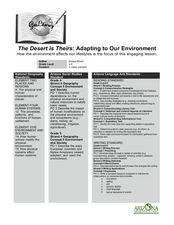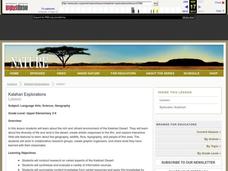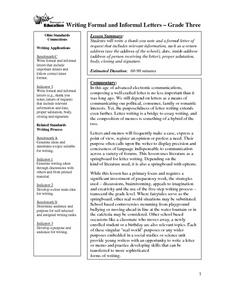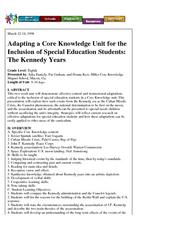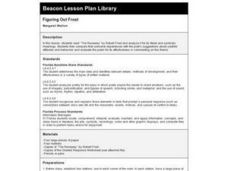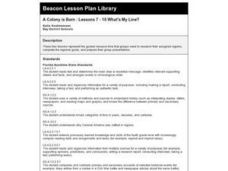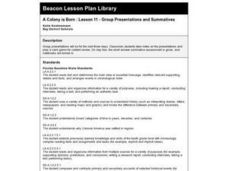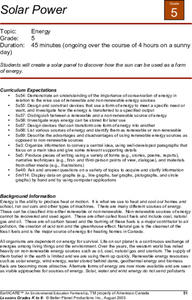Alabama Learning Exchange
Echolocation Stations: Exploring Sound
Fourth graders explore the concept of echolocation during a unit on whales. They listen to the book and watch the Reading Rainbow video for "Humphrey: The Wayward Whale," explore various websites, and conduct experiments to demonstrate...
Curated OER
Mother's Secret
In this reading comprehension worksheet, 3rd graders read a page long story about a mother's pregnancy and answer 5 multiple choice questions.
Curated OER
Memories, A Connection to the Past
Students read four or more books. They make predictions before reading, complete a picture walk, read in partners and complete graphic organizers. Various graphic organizers are provided in English and Spanish.
Curated OER
In The Zone
Third graders identify ways that ocean animals grow, survive, reproduce, and adapt. They use computer Internet skills to acces and collect information. They create a PowerPoint presentation. They demonstrate writing skills throughthe...
Curated OER
Let Me Tell You About My Favorite Animal
Students create books about their favorite animals using graphic organizers.
Curated OER
The Problem with Prejudice
Third graders read and discuss "The Hangman" by Maurice Ogden and answer questions about the poem. They list things they can do to combat prejudice using each of the letters in the word and create a small poster with a slogan against...
Curated OER
Native American Bartering
Fifth graders create items to barter. In this Native American bartering lesson, 5th graders read a book, design and make items, and barter with their peers. Students reflect on the experience through journal writing.
Curated OER
Children Using Antonyms to Write Short Stories
Second graders discuss what antonyms are and read the book, Quick as a Cricket. In this antonym lesson, 2nd graders write a short story by describing themselves.
Curated OER
The Cherokee: Trail Where They Cried
Learners read the Trail of Tears about the Cherokee Nation removal and write a letter pretending they are the grandparent of a Cherokee child. In this Trail of Tears lesson plan, students understand the changing of boundaries.
Curated OER
The Circle of Life: Food Chain
Learners develop a flow chart using computer software to show a food chain combination. In this food chain lesson, students are first read The Great Kapok Tree by Lynne Cherry, then they create a story map of the story. Next,...
Curated OER
The Desert is Theirs: Adapting to Our Environment
Students determine how animals and people adapt to the desert environment. In this desert lesson, students review vocabulary about the desert and how humans have to make changes to accommodate their environments. They listen to and...
Curated OER
Paragraph Writing
Third graders receive Gummi hamburgers. They discuss parts and structure of a (real) hamburger. Students dissect the gummi hamburger and rearrange the pieces. Students discuss the problems that would be caused by this with a real...
Curated OER
Kalahari Explorations
Students explore world geography by completing graphic organizers and researching the Internet. In this Kalahari desert instructional activity, students identify the geographic location, weather and creation of the Kalahari desert....
Curated OER
Writing Formal and Informal Letters
Third graders write a thank-you note and a formal letter of request that included relevant information, such as a return address, date, inside address, proper salutation, body, closing, and signature. They write an imaginary letter to...
Curated OER
Elements of Myth
Students read and act out myths. In this world mythology lesson, students read and analyze myths from various cultures and then recognize their attributes as they prepare presentations of myths that explain natural phenomena.
Curated OER
The Kennedy Years
Eighth graders read text and view films about the Kennedy administration. In this preseidential administration lesson, 8th graders interview someone who lived during Sputnik, write summaries of lectures, and create posters demonstrating...
Curated OER
Figuring Out Frost
Fourth graders read "The Runaway" by Robert Frost and analyze it for its literal and symbolic meanings. They compare their personal experiences with the poet's suggestions about youthful attitudes and behaviors. Some nice worksheets are...
Curated OER
Women's Right To Vote
Fifth graders explore the history of women's right to vote and identify two of the leaders of the suffrage movement, Alice Paul and Lucy Burns. After completing readings and discussions, they write an article for the newspaper about...
Curated OER
Lesson 8: Summarizing Information
In this summarizing information instructional activity, students read a featured article, summarize the article, identify the story's five W's and one H, and identify appropriate relevant facts.
Curated OER
A Colony is Born : Lesson 6 -To Leave or Not to Leave
Fifth graders connect reasons for coming to the New World with identity. The create identities and place them in one of three settled regions. They refer to prior study notes in their Colonial Notebooks to establish their identities.
Curated OER
A Colony is Born : Lessons 7 - 10 What's My Line?
Fifth graders research their assigned regions, complete regional guide and prepare presentations about the New World colonists. They refer to "Everyday LIfe: Colonial Times" as well as searching marked internet sites.
Curated OER
A Colony is Born : Lesson 11 - Group Presentations and Summatives
Fifth graders give presentations on colonial research. The others take notes on the presentations. They play a card game which helps them review content. They take a summative assessment and present their research notebooks.
Curated OER
Solar Power
Fifth graders create their own solar panel. They use this experiment to see how the sun can be used as a form of energy.
Curated OER
A World of Myths
Students read and write myths. In this world mythology lesson, students read and analyze myths from various cultures and then recognize their attributes as they write their own myths to explain natural phenomena.
Other popular searches
- Main Idea and Details
- Main Idea Supporting Details
- Main Idea & Supporting Details
- Main Ideas Details
- Main Ideas and Details
- Main Idea Details
- Main Ideas & Details
- Finding Main Idea Details
- Main Idea & Details
- Identify Main Idea and Details
- Main Ideas Supporting Details
- Main Ideas. Supporting Details










